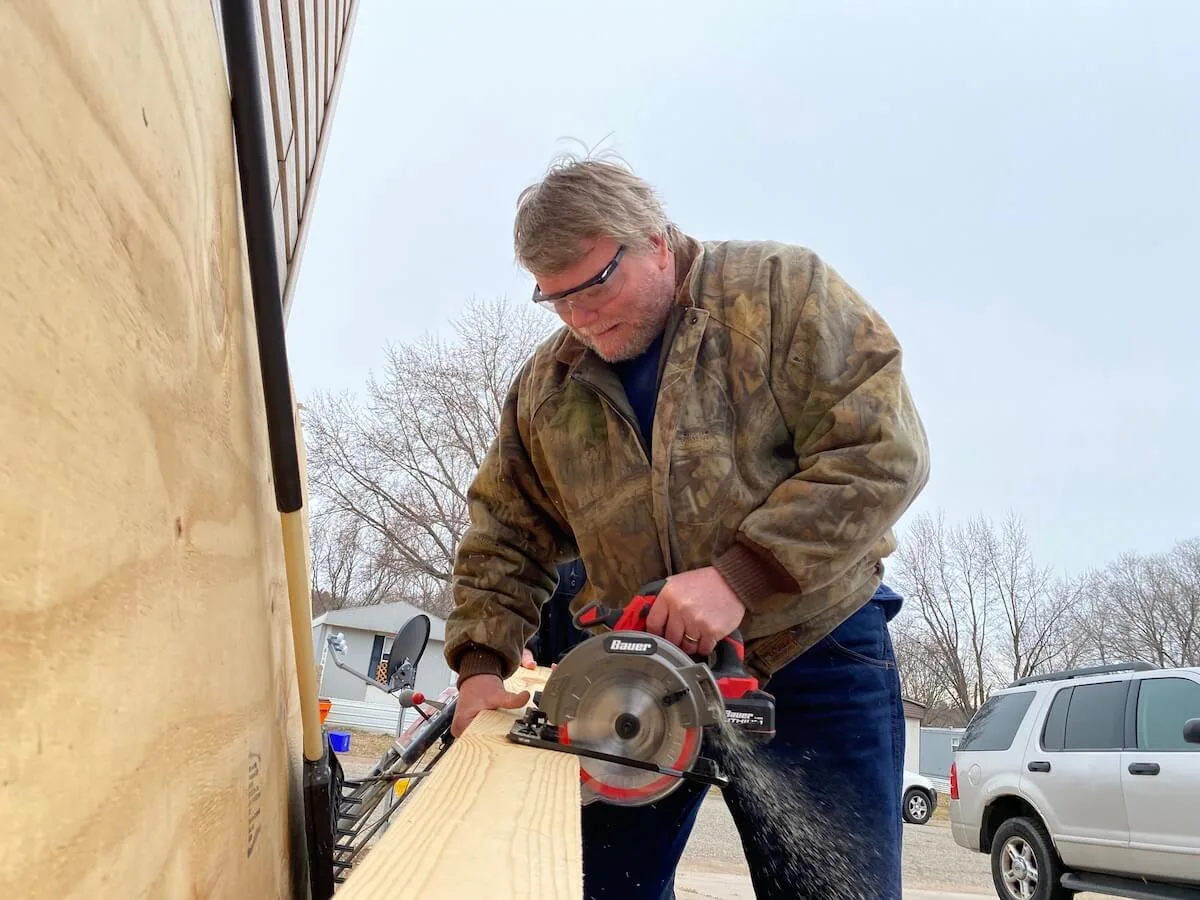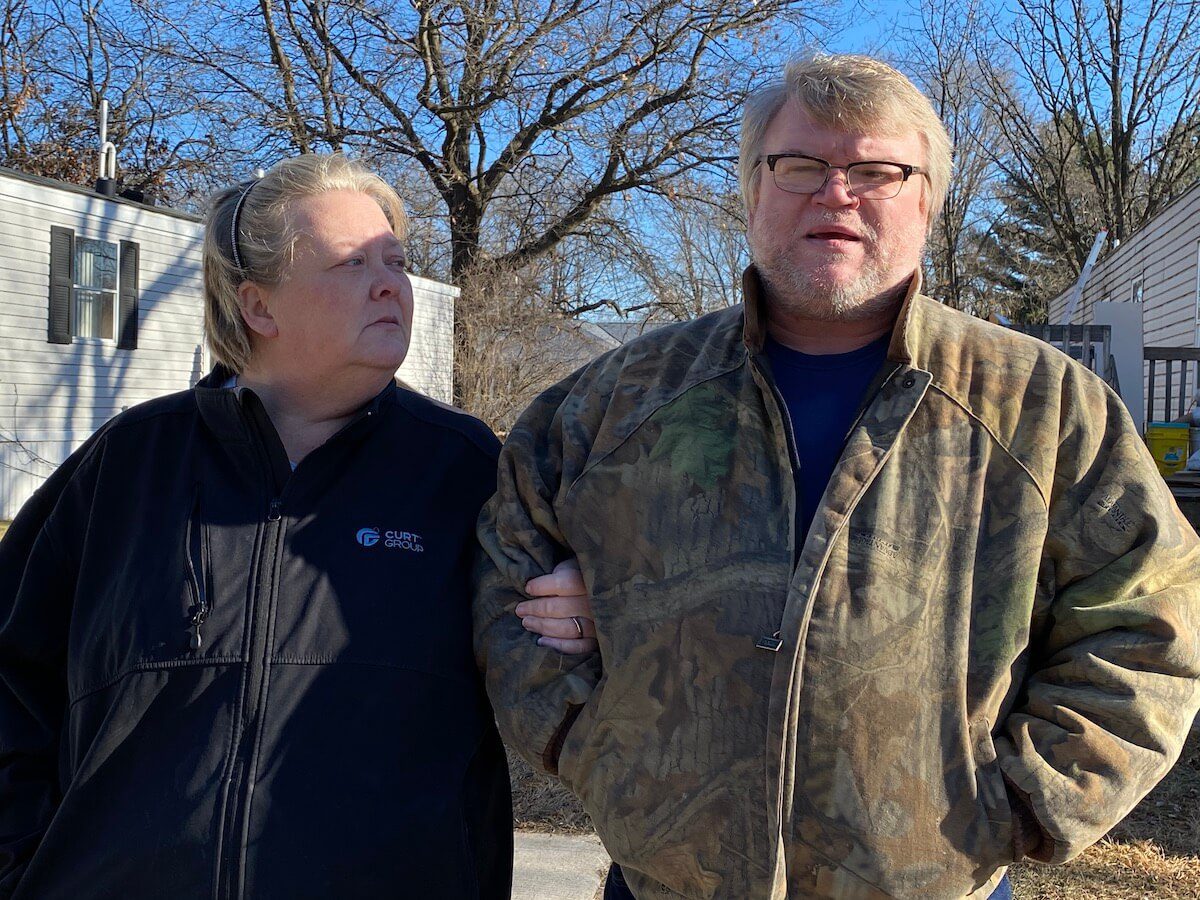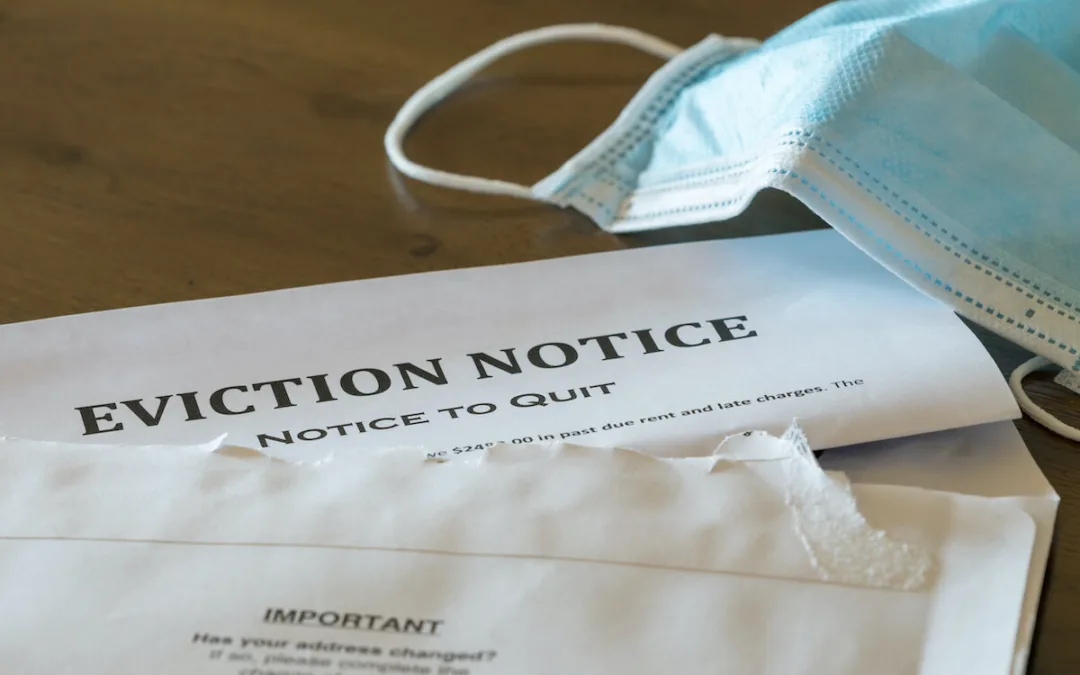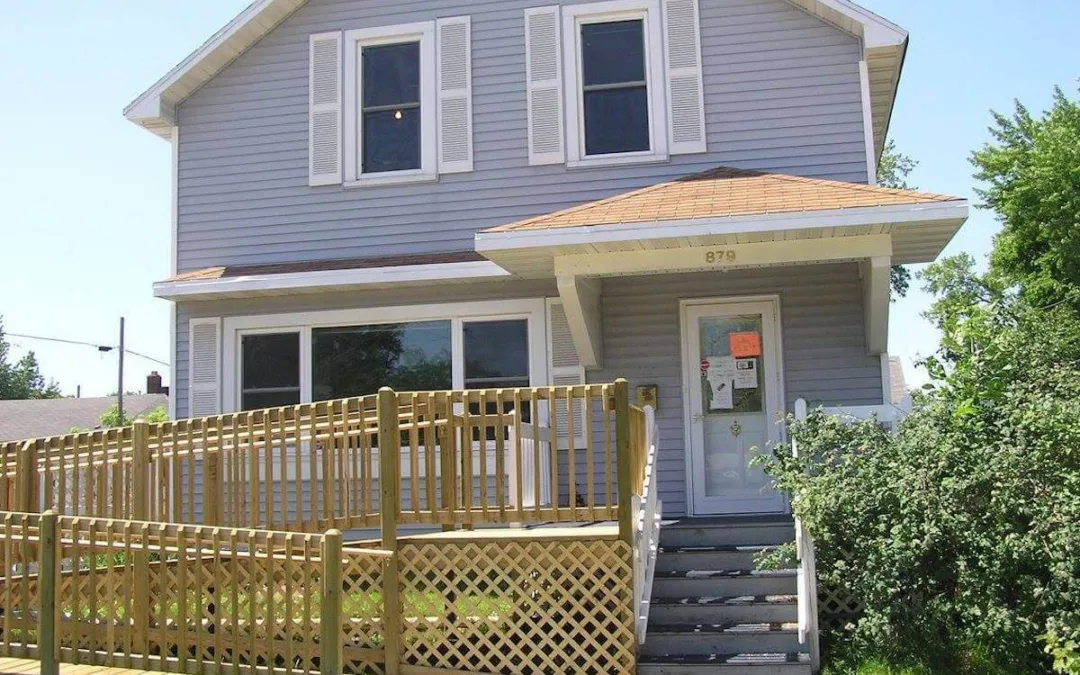
#image_title
#image_title
With more than 12,000 evictions since a state moratorium expired, as many as one-third of Wisconsin renters will be at risk of eviction if there is no extension of federal eviction moratorium.
[Editor’s Note: This story was originally published Dec. 15, 2020. On May 5, 2021, a federal judge struck down the national eviction moratorium, setting up an uncertain future for renters who have been unable to keep up during the pandemic.]
When Heidi Oertel received notice on Sept. 3 that she and her fiance would at the end of the month be kicked out of the mobile home where they lived, she feared the couple would end up homeless.
Oertel, 49, said she and Tom Danielson, 55, had fallen about $2,500 behind on rent payments as they struggled to make ends meet, existing on their Social Security disability payments. Their situation was made worse when Danielson did a stint in jail related to a disorderly conduct conviction.
Still, Oertel said they cobbled together what money they could, paying the $675 monthly rent and making up for back payments.
According to a handwritten note signed by Oertel’s landlord, the past-due rent was paid up by the end of August, and Oertel figured those payments meant she and Danielson would be able to maintain their housing.
But that money apparently wasn’t enough, and the mobile home park’s owner subsequently notified Oertel that she and Danielson couldn’t continue to live there.
“I was doing everything I could to get paid up on rent,” Oertel said. “I thought it was going to be okay. Then I got that [eviction] letter, and it was an awful feeling. All of a sudden we didn’t have a home.”
The eviction of Oertel and Danielson is just one of 12,224 filed in Wisconsin as of Thursday since May 26, when Gov. Tony Evers’ 60-day eviction moratorium lifted, court records show. The number of evictions represents a more than 12% increase over the average number filed in the same time period from 2011-19, according to an UpNorthNews analysis of court filings.
Those actions are occurring despite a provision of the federal Coronavirus Aid, Relief, and Economic Security Act that prevented evictions from properties with federally backed mortgages until July 24, and a more recent federal eviction moratorium from the Centers for Disease Control and Prevention issued on Sept. 4.
But the CDC’s moratorium is not as sweeping in its scope of protection as Evers’ order and explicitly requires renters to pay all of their back rent and associated late fees or fines. The CDC order will lift Jan. 1, likely prompting a huge surge of people being forced from their homes in the middle of the coronavirus pandemic that continues to stress the economy and infect or kill thousands of Wisconsinites. About one-fifth of US renters are behind on rent and more than a third have “no” or “slight” confidence in their ability to pay next month, according to the most recent biweekly Census Bureau Household Pulse Survey.
Eleven housing advocates and other experts from around the state told UpNorthNews they expect a flood of evictions to come with the new year. Some said as many as one-third of Wisconsin renters are at risk when the floodgates open.
“I’m not by nature a dramatic person, but I think the word ‘catastrophic’ is completely applicable,” said Colleen Foley, executive director of the Legal Aid Society of Milwaukee, one of the nation’s oldest public-interest law firms. “It’s January, it’s the Wisconsin winter, and we have a raging pandemic.”
Michael Basford, director of the state Interagency Council on Homelessness, agrees. The combination of a swell of pending evictions, the ongoing coronavirus pandemic, and winter weather creates the conditions for a pending housing “perfect storm,” he said.
“There is substantial concern about the dire situation we could be looking at,” Basford said. “There is the very real potential for millions of Americans to wind up in eviction court, and that includes thousands of people right here in Wisconsin.”

Extended moratorium discussed
Evers recently proposed extending protections against forcing people from their homes because of a failure to pay rent related to the pandemic through the end of next year. But that appears unlikely to happen given that Assembly Speaker Robin Vos (R-Rochester) said last month it “wouldn’t be good for the economy” to not require people to pay rent. Vos is a landlord who owns almost two dozen rental properties worth $3.8 million.
But housing advocates pointed out that such an argument against an extended moratorium assumes there is no funding behind it to make sure landlords can pay their mortgages and avoid foreclosure.
“I think it’s really short-sighted,” said Kristin Slonski, litigation director and managing attorney for housing defense at Wisconsin Judicare, a public-interest law firm that serves low-income people in the state’s 33 northern counties. “What they’re talking about, it being bad for the economy, is extending an eviction moratorium that doesn’t have any rental assistance attached to it.”
President-elect Joe Biden is reportedly considering a federal moratorium, but renters would have to wait for relief until at least Jan. 20 if Congress or outgoing President Donald Trump’s administration don’t extend the current one.
While many landlords are working with tenants to accommodate their financial challenges amid the pandemic, others are finding other reasons besides lack of income related to COVID-19 to oust people from their homes who are struggling to keep up with rent.
“Most landlords are working within the rules, but we are seeing some who have been evicting tenants this year,” said Anna Cardarella, CEO of Western Dairyland Economic Opportunity Council, which provides assistance to people in need in Eau Claire, Buffalo, Trempealeau, and Jackson counties.
Her agency has reported “a handful” of landlords to the state for evicting tenants despite their having received state funding that paid those tenants’ rents, Cardarella said. Others who work with housing in Wisconsin said they also are aware of landlords evicting tenants despite having received state rental assistance dollars.
Basford said in many cases, enforcement of the CDC tenant protections “has not been very aggressively enforced,” leading to evictions in which some tenants should have been protected.
Tenants aren’t the only people feeling the financial housing crunch of the pandemic. Without timely rent payments, many landlords are also struggling, housing experts said.
Landlords across Wisconsin report receiving lesser rent collections, in some cases by substantial amounts. Some, especially those who have previously paid off the homes they rent, are able to withstand lower payments.
But others report that having many tenants far behind on rent leaves them unable to make mortgage payments on their rental properties. Housing experts said it is unlikely most renters will be able to come up with past-due rent payments in compliance with the CDC moratorium.
“It’s not like people who have been struggling financially are going to magically come up with this money,” Cardarella said.
John Manno owns five rental properties in Ashland. He said he is working with his tenants to ensure they remain housed and said most landlords are willing to do the same because of expenses involved with evictions and other expenses related to losing tenants. “And you feel like a jerk” if you evict people, he said.
However, many landlords are feeling the financial pinch of lost tenant income, he said, and can’t go without rent payments indefinitely. As the pandemic drags on and federal subsidies are running out, more people are struggling to pay for housing, Manno said.
“Even a lot of the tenants who are fine are dangerously close to not being fine,” he said.
Cardarella and others who work on housing issues acknowledged the struggles of many landlords this year. Many landlords are doing their best to keep tenants housed, they said.
“Most of the landlords really are trying to work with their tenants,” Cardarella said. “They have bills to pay and need income just like the rest of us.”
Manno volunteers at a local food pantry, and demand for that service has grown during the past couple of months, a sign of more people struggling with paying bills.
“More and more people out there are hurting,” he said, noting Congress needs to approve added funding to help people in need to avoid a significant number of people losing housing.

Assistance drying up
To keep people in their homes, $28.4 million in CARES money was distributed through the Wisconsin Rental Assistance Program (WRAP) to more than 14,000 state residents to keep them in their homes this year.
However, the need for those dollars exceeded available funding, housing advocates said. As January approaches with no apparent political will to maintain housing protections, an estimated tens of thousands of people are at risk of losing their homes because they can’t make rent payments.
People already struggling economically before the pandemic have been especially impacted by economic disruptions that began in Wisconsin in March and have continued since, experts said. Such CARES Act payments as higher unemployment benefits, the Paycheck Protection Program, and WRAP dollars helped people continue to make mortgage and rent payments.
But CARES Act funding is scheduled to expire at the end of this year, and an extension of additional federal government assistance to address pandemic-related needs remains uncertain. Congress has been deadlocked for months regarding another round of aid even as coronavirus cases and deaths have risen sharply this fall and as economic struggles continue for many.
Business struggles because of a lack of foot traffic resulting from people’s concerns about contracting COVID-19 mean many employees have lost hours or jobs altogether, making rent payment increasingly difficult to maintain.
Cardarella said reduced income from job losses or reductions and people having to quarantine because of exposure to COVID-19 has left many struggling to pay for housing.
Some have fallen months behind on their rent, she said, and many will struggle to make up that deficit in upcoming months, especially as the impact of the virus continues. WRAP disbursements helped keep thousands of households, including 551 in Western Dairyland’s region, in their homes. But more funding is needed to retain housing for them and others, she said.
“We know that so many people could be evicted once we get to January,” Cardarella said. “It is a huge issue, and it is something we are very concerned about.”
Other Wisconsin housing experts echoed that sentiment. From Milwaukee to Green Bay to La Crosse to Superior, directors of agencies who work with people in need of housing said the expiration of eviction and foreclosure protections at the end of this year represents a crisis.
Liz Seefeldt, executive director of The BRICK Ministries in Ashland that helps people in need of housing with rent payments, said many people in northern Wisconsin are struggling to pay for housing. The region relies heavily on tourism, a sector hit especially hard by the pandemic, leaving many unable to keep pace with rent and mortgage bills, she said.
“We are really struggling up here in the northwoods,” she said. “With less income, now instead of facing two months of overdue rent, some people are four, five, or six months past due. They won’t be able to dig themselves out of that hole, and we worry that come January, we are going to see a lot of evictions.”
But even with WRAP funding available, not everyone was able to use it.

Tom Gibson, a 54-year-old from New Richmond who works in sales, faced an eviction from his landlord in 2019. Court records show they were able to come to a mediation agreement. Gibson said he began paying what he owed until April of this year when he suffered a brain bleed and was hospitalized for two weeks.
Gibson has been without income since his hospitalization. He said he has been unable to collect unemployment insurance or disability payments, and his employer does not offer disability coverage.
At this point, Gibson said he is about $9,000 behind on rent and utilities. He said his landlord wouldn’t sign off on receiving WRAP funding to cover rent because of a personal dispute between them, and now his landlord refiled for eviction. Gibson got help from Slonski, the attorney at Judicare, and used the CDC’s moratorium to prevent his eviction, but he knows that’s only delaying the inevitable.
“I don’t know come Dec. 31 what I’m gonna do,” Gibson said. “It’s an awful cold time of the year to be sleeping in a vehicle, and if they come and tow that away, I won’t even have that option.”
Gibson isn’t even sure how he would move out if he ends up being evicted. He still has blood on his brain, he lives in an upper unit, and he’s restricted to carrying no more than a gallon of milk, he said.
Renters aren’t alone in facing the possible loss of their homes as they struggle to keep a roof over their heads. Many homeowners also are scrambling to come up with mortgage payments on their homes as the pandemic drags on, state Treasurer Sarah Godlewski said.
In March Godlewski announced the formation of the Treasurers’ Task Force for Homeowners, an initiative intended to prevent foreclosures by utilizing information available to county treasurers to identify people in need of housing assistance before they lose their homes.
In recent months her office has fielded calls from homeowners and renters across the state “who face the very real threat of eviction or foreclosure,” Godlewski said. The task force is working to provide early interventions to prevent such actions, she said, and includes a pilot project, the COVID Property Tax Foreclosure Prevention effort in the La Crosse area.
Still, Godlewski said, people are losing their homes, and many more face that prospect unless additional protections and resources are enacted soon.
“With Congress refusing to act, we will see more Wisconsinites losing their most precious asset—their homes,” she said.
Homeless concerns
Without an extension of protections for renters or homeowners facing eviction or foreclosure, advocates for people who are homeless said they are bracing for a wave of new clients at a time when their resources are already not enough and they face a crisis dealing with COVID-19.
Carrie Poser, director of the Balance of State Continuum of Care that oversees homelessness in 69 of Wisconsin’s 72 counties, said a large influx of newly homeless people seems likely at the beginning of the new year.
“Unless there is a federal extension of the moratorium or the state does something, January 4 will be a very busy courthouse day,” Poser said of the first day of the new year in which courthouses will be open.
Homeless agencies across the state report more people living on the streets as shelters have had to reduce capacity to conform with social distancing measures because of the virus. COVID-19 has surged through the homeless population, officials said, in some cases temporarily closing shelters.

In October Wisconsin received CARES Act emergency grants to keep people in housing and provide rapid rehousing for homeless residents, Basford said. He hopes to receive another disbursement for that purpose by the end of this year, but that won’t be enough if many thousands of residents are evicted in upcoming months.
“Even before the COVID crisis, homelessness was in a state of crisis. And (the pandemic) has exacerbated it by tons,” he said.
After their eviction, Oertel and Danielson didn’t know how they would find another home they could afford, and they feared they would wind up living on the streets. They spent a month after losing their home living in a hotel, but they couldn’t afford the $1,050 monthly cost. Desperate for a home of their own, they drove from mobile home park to mobile home park, searching for something for sale they could afford.
Then, in October, they found one. The trailer home in Oakridge Mobile Home Village was in rough shape, having been vacant for years. It didn’t even have running water, and the furnace was in pieces on the living room floor.
But the price was right—only $1,000. Oertel and Danielson bought it and got busy making repairs. Danielson has made numerous updates to the structure and figures in addition to his labor they’ve spent $4,000 so far. More improvements are on the way, the couple said, as they hope to bring their friend Linnea Engles, who currently resides at a long-term care facility because of a physical disability, to live with them.
“We were in a tough spot. We didn’t know what we were going to do,” Danielson said. “It’s real scary when all of a sudden you don’t have a place to live. Then we found this place, and we decided to make it a home. It’s a blessing.”
Jonathon Sadowski contributed to this report.
Politics

Biden makes 4 million more workers eligible for overtime pay
The Biden administration announced a new rule Tuesday to expand overtime pay for around 4 million lower-paid salaried employees nationwide. The...

Biden administration bans noncompete clauses for workers
The Federal Trade Commission (FTC) voted on Tuesday to ban noncompete agreements—those pesky clauses that employers often force their workers to...
Local News

Readers Poll: Top Bowling Alleys in Wisconsin
Looking for the best bowling in Wisconsin? Look no further! Our readers have spoken in our recent poll, and we have the inside scoop on the top...

8 Wisconsin restaurants Top Chef judges are raving about
Top Chef’s 21st season is all about Wisconsin, and on-screen, it’s already apparent that the judges feel right at home here. But, while filming in...




